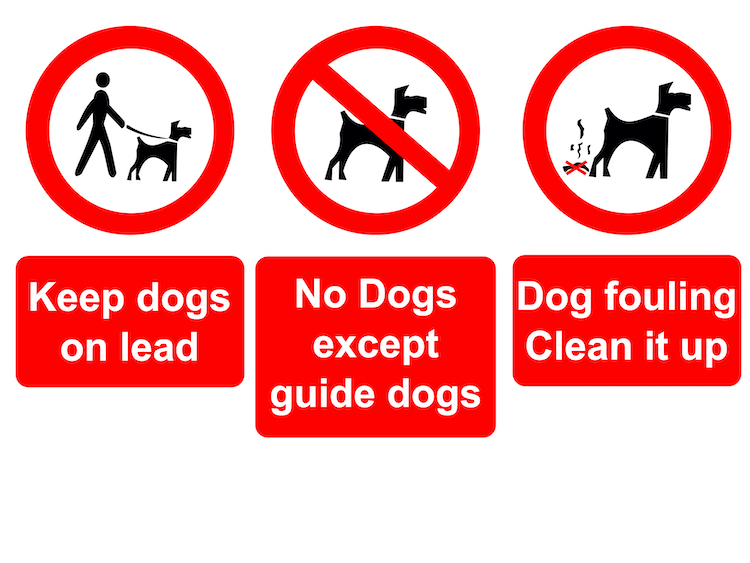
Part of being a responsible dog owner is making sure you adhere to the laws and regulations surrounding dog ownership. Many new dog owners don’t even realise there are specific laws relating to what you can and can’t do with your four-legged friends so we have put together this useful guide of some of the main things you need to be aware of.
Registration and Microchipping
As of April 2016 is it mandatory for all dogs over the age of 8 weeks in the UK to be microchipped. Exemptions are available if a vet believes there is a valid health reason not to microchip a dog but they must provide a certificate of exemption in this instance. Owners who do not get their dog microchipped and registered with an approved database face a fine of up to £500 if caught.
Relevant Law: Law: Microchipping of Dogs (England) Regulations 2015, Microchipping of Dogs (Wales) Regulations 2015
Dogs on leads
It’s important to remember that different local authorities can have varying rules and regulations but in general there is no rule that says dogs have to be on a lead at all times in public places.
What there are in place however are a series of orders that mean you have to leash your dog in certain types of places such as children’s play areas, sports pitches, roads, parks, and beaches. People not adhering to these orders can be subject to fines or fixed penalty notices. It’s worth mentioning that some local authorities have gone to the extent of bringing in Public Spaces Protection Orders which prevent dogs from being in certain areas full stop!! If in doubt it’s always worth checking their website.
Relevant Law: Road Traffic Act 1988, section 27; Anti-social Behaviour, Crime and Policing Act 2014
Dogs fouling
Now for most of us picking up after your dog is just a given. No one likes to see dog mess on the ground and risk stepping in it and not picking up after your dog is just plain bad manners. We believe it is just good practice to pick up after your pooch no matter where you are but from a legal perspective, it is not a requirement to do so everywhere such as woodland, heathland and land used for animal grazing.
Local authorities have the power to introduce Public Space Protection Orders (PSPOs) to tackle the issue of dog fouling and this includes requiring dog owners to pick up after their dogs in certain areas or requiring owners to carry poo bags on them at all times. Owners can be issued with a fixed penalty notice of up to £100 for not complying with regulations. Please note that owners of assistance dogs are exempt from these regulations so for instance a registered blind person isn’t required to pick up after their guide dog.
Relevant Law: Environmental Protection Act (1990), Litter (Animal Droppings) Order 1991; Anti-social Behaviour, Crime and Policing Act 2014
“Owners can be issued with a fixed penalty notice of up to £100 for not complying with regulations.”
Dogs and livestock
Understandably there are laws to protect livestock from dogs. The actual term referred to is that dogs are not allowed to ‘worry’ livestock. Even if your dog isn’t aggressive or does not bite livestock, just the simple act of chasing or barking at them can cause pregnant animals to abort their young through stress. Please remember to be considerate of this when walking your dogs in areas that may contain livestock.
These animals typically belong to a farmer who cares for them and naturally would be protective over any harm coming to them. If you think you are in an area where you may come across some livestock then we would advise you to play it safe and keep your dog on its lead. Even the most sedate dog can sometimes become excited by new smells and act out of character and take up the chase. If your dog does ‘worry’ livestock then according to the regulations the farmer has the right to shoot any dog on its land that they deem a threat and when you are faced with the chance of that occurring it’s just not worth the risk.
Relevant Law: Dogs (Protection of Livestock) Act 1953, Animals Act 1971,section 3

Dogs in food establishments
The law around taking dogs into food places such as cafes, restaurants and pubs is pretty common sense. It is up to the owners of the business to decide if they welcome dogs inside or not, the only rules they have to adhere to according to health and safety regulations is that the dogs must not enter any area where the food is actually prepared, handled or stored e.g. the kitchen.

Relevant Law: Food Hygiene Regulations 2013, under EU Regulation (EC) 852/2004, Annex II
Dogs on roads
If the unthinkable happens and your dog is injured on the road, by law the person who injured them with their vehicle must give their name and address to the owner, or person in charge of the dog. If there is no person with the dog at the time, the driver should report the incident to the police within 24 hours.
Law: Road Traffic Act 1988, section 170
If however, your dog causes a road incident that causes injury, illness or death you could be liable to a claim from the injured party if you are proven liable. Third-party liability insurance can be taken out to protect against any costs or compensation you may need to pay if your dog does cause an accident.
Law: Animals Act 1971, section 2
Breed-specific legislation
In the UK, Breed Specific Legislation bans the ownership of four different types of dogs traditionally bred for fighting: pit bull terrier, Japanese Tosa, Dogo Argentino and Fila Braziliero.
Law: Dangerous Dogs Act 1991, section 1
Highway Code
The Highway Code requires dogs to be ‘suitably restrained so they cannot distract you while you are driving or injure you, or themselves, if you stop quickly’ (rule 57).
If you were in a crash, an unsecured dog will be thrown forward with significant force. This could result in your pet’s death, and depending on the size of your dog, could also injure or kill the driver or passengers. It is worth mentioning also that dependant on your vehicle insurance policy many insurers will not honour a claim if it is proven that you were travelling with an unsecured dog in the vehicle.
Disobeying the Highway Code doesn’t carry a direct penalty however drivers could be pulled over by police and fined up to £1,000 for driving without proper control if their pet distracts them. That could be stepped up to failing to drive with due care and attention (careless driving) which carries a maximum fine of £5,000 and nine penalty points if the case goes to court.
Dogs under control in public spaces
It goes without saying that a dog must not be allowed to be ‘dangerously out of control’, which means injuring someone or making someone fear they may be injured. This is applicable to any breed or type of dog. Owners who allow their dog to hurt a person face punishments of up to three years in prison for injury, or 14 years for death, an unlimited fine, disqualification from owning pets, and having their dog destroyed. It is also an offence to allow a dog to injure a registered assistance dog. Even in cases where no harm is caused, the penalty can still be imprisonment for six months, a fine of up to £5,000 and being banned from owning pets and have their dog destroyed.
Law: Dangerous Dogs Act 1991, section 3
Tail docking
It’s against the law to dock a pet dog’s tail, in whole or in part. There are of course exemptions to the if tail removal is needed for medical reasons, or if the dog is destined to become a working dog. If that is the case then a puppy’s tail can be docked if they are less than five days old. This exemption only applied to certain breed types, and these defined types are different in England and Wales.
Relevant Law: Under the Docking of Working Dogs Tails (England) Regulations 2007, Docking of Working Dogs Tails (Wales) Regulations 2007
Barking
We all know that dogs bark and it is the most natural things in the World as it’s their principal way of communicating but sometimes barking excessively can cause issues, particularly when it affects neighbours and others around you.
If the local authority receives a complaint about excessive barking their environmental health department can formally ask you to stop your dog from continuing the behaviour, and if you don’t, they can take your dog away from you. Persistent barking is most commonly a sign of distress so to try and understand more about potential causes we recommend you take a look at our article on barking and if in doubt seek help from a professional.
Relevant Law: Environmental Protection Act 1990
Laws relating to dog walkers
If you use a dog walker it’s important to understand what rules and regulation they should be adhering to so you can be sure you are picking the right one for your dog. First and foremost they should also be able to exhibit some form of professional qualification, skill or experience and they must be insured. The type of insurance they need depends on what level of service they are providing e.g. if they are also expected to be a key holder. A lot of walkers also decide to undergo a Criminal Records Bureau (CRB) check to confirm their integrity. Ideally, a good dog walker will also be qualified in pet first aid and have undergone some form of training to enable them to cope with situations involving dog aggression, attacks or injury. Good practice suggests they should offer a consultation to gain information about your dog before they can be walked safely, and they should also ask you to sign a contract of care and relevant veterinary release forms so that your dog can be treated by a vet in case of emergency.
Laws relating to boarding and kennels
Anyone boarding animals (even at home) needs to be licensed by their local authority. Before granting a licence an officer or vet appointed by the local authority will inspect the premises to ensure that they comply with the legal requirements of the act. As you would expect they must be covered by adequate and suitable public liability insurance and, where necessary, adequate and suitable employer’s liability insurance.
When a boarder takes on a new dog you would expect that they would ask for proof that your dog is up to date with current vaccinations. The course of vaccination must be completed at least 4 weeks before the first date of boarding or in accordance with veterinary and or manufacturers instructions. Whilst boarding, dogs must live in the home as family pets. There must be no external construction of buildings, cages or runs. No dog registered under the Dangerous Dogs Act 1991 must be accepted for home boarding.
Relevant Law: Animal Boarding Establishments Act 1963
